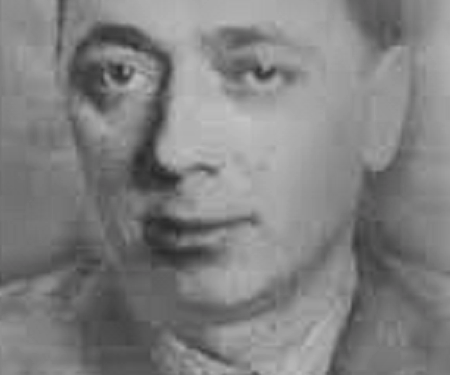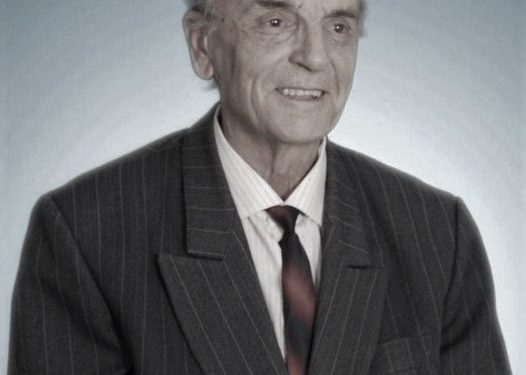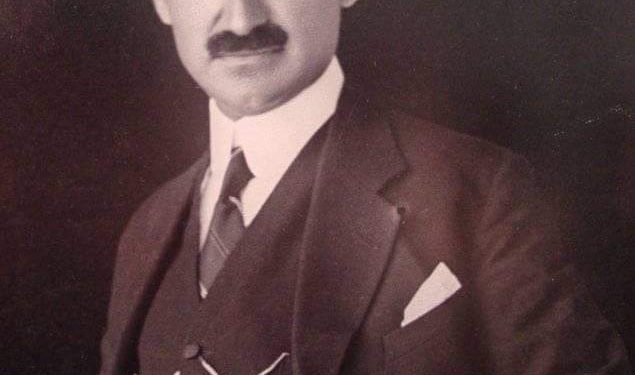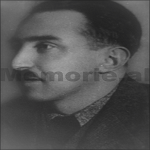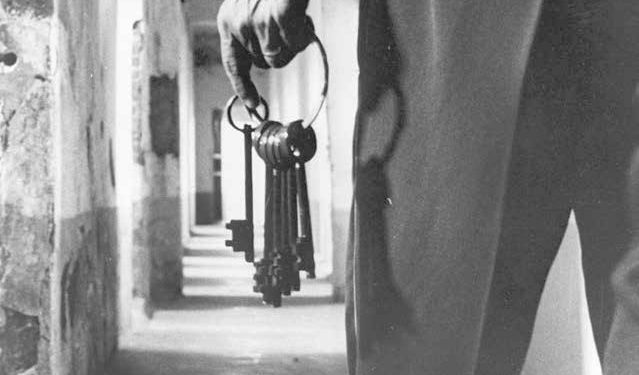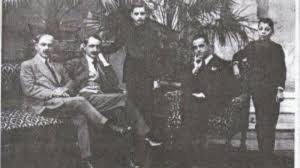By Reshat Kripa
Memorie.al / He closed his eyes on April 26, 1991. He closed them without yet tasting the fragrance of freedom that had just begun to bloom, but he left with the same confidence he had in his youth when he wrote: “I’m dying! … / Oh, let it die! / Let only Albanian live”!
No formal speeches were made at his grave. Dithyrambs were woven, verses were read. His co-sufferers, his brothers, Victor, Tomorri, Angel, etc. spoke. He did not die, because martyrs do not die. He continues to live, with his verses, with his works, with his personality.
He was born in 1908 in the city of Vlora. Son of a large civic family with rich patriotic, nationalist and intellectual traditions. It was born in those years when Albania was preparing to sign the biggest act of its history, since the time of the legendary Skanderbeg, the act of national independence, where alongside the signature of the Elder of Vlora, that of Qazim Kokoshi, the uncle his.
It would be this Qazim Kokoshi again, one of those who would form the leading trio; Osmën Haxhiu, Qazim Koculi and Qazim Kokoshi, in the Patriotic War of Vlora in 1920, to continue with his patriotic activity, until he would end his life, in the prison of Vlora in 1946, as an opponent of the communist regime.
The ordeal of the Kokoshi family would continue even longer. Two shots by the dictatorship, Abdyli and Metua. One fallen in the war with the Italian occupiers, Astriti. Seven political convicts.
The story would go on and on. She would make the hand of a son of this family, Altin Kokoshi, have the honor to raise in Vlora, under the nose of the communists, after 47 years of denial, the two-proud flag without the hated star of shame and oppression, on November 28 1991.
Since Kudreti was a child, his father Hasan Agaj knew his son’s character and intellect. He sent him to Rome, where he completed his secondary and higher studies, graduating with a “Doctor of Jurisprudence” in 1933. He returned to Albania at the age of 26. He mastered the Italian language perfectly. But no less, he mastered French, Latin and ancient Greek. With all the high western culture he had, he preserved the features of an Albanian, or to be more precise, of a true Labian, both in his habits and in his way of speaking.
He, the citizen of Vlonia, knew the customs and the simple language of Labe, which he poured out with all its strength in his verses. He had the ability to communicate freely, with the shepherd who had no schooling, but at the same time, he was able to face, even with the most prominent intellectual of world culture.
Above all, his passion was poetry. When he returned home on vacation, he listened attentively to the stories of the events and prominent men of the country from the members of the family. He heard about Toto Bolena, with his stomach ripped open by the machine gun, and Selam Musa, who took the ball from the mouth. He heard about Ismet Toto and other men, and these stuck in his mind. He locked himself in his room, created immortal poems and recited them passionately. When he saw that the lamp in his room was on until late at night, he would get up and listen without feeling behind the door.
Thinking that he was talking to himself, she returned to the room and said to her husband: – “Husband, what has our son suffered! Are you talking to yourself”?! His other passion was sports, especially football. He was one of the best players of the high school team where he studied and of the city of Vlora, which at that time was called “Ismail Qemali”. They often took him by plane to play the matches of the country’s national championship. The elderly people of Vlonia still remember the popular song at that time: “Forca Nani and Kudreti, Like the devil with the curse”!
It was football that caused him to enter justice. The year he finished high school; his high school team won the title of champion for schools of this category in Rome. Most of the players of this school were enrolled in the faculty of law, so even Kudreti could not be separated from them. But he never forgot the poem. The verses written in that period are among the most successful of his creativity.
He started his legal career in 1933, opening a law office in Vlora, an activity he continued until 1936. That same year, he was appointed assistant judge in Bilisht and later in Pogradec. April 7, 1939, finds him a member of the court of first instance in Korça. Later, he goes with this task to Shkodër and Tirana. Those were the years of great clashes.
Behind Albania’s back, the great tragedy was being prepared, which would continue for half a century. As in many other situations even then, the country had forces that were not blinded by the demagogy of those who propagandized that they would make the people “to he ate gold with a spoon”. It was Albanian nationalism, one of whose forces was that of the ‘National Front’ directed by the corypheus of Albanianism, Mit’hat Frashëri and the cream of the Albanian intelligentsia of that time.
Kudret Kokoshi also found himself in this force. Engaged in the ranks of the ‘National Front’ as a member of the Vlora circuit and participated in all its main activities. At the behest of Mit’hat Frashëri, in 1941, Hasan Dosti proposed to him to go to Kosovo, for the organization of the courts there and for the formation of cadres with contemporary legal knowledge. Seeing the state in which this branch of the mother country was, Kudreti accepted without hesitation.
Appointed Chief State Prosecutor in Prizren. He tirelessly helps the Albanians of that province in solving judicial problems. They made possible the annulment of some unjust decisions, given to their detriment. He organizes meetings between Kosovar Albanians and those who had come to work from Albania, where he discusses the future of this province and all of Albania.
On November 28, 1942, he was at the forefront of the great anti-fascist demonstration, held in Prizren, where he was wounded by the Italian militia. It was the intervention of an Albanian gendarmerie officer, who saved him from death, removing him from the clutches of the militia, who, although wounded, continued to shoot him with the butts of their rifles. Unconscious and with a wound on his head, this patriotic Kosovar took him and accompanied him to the Tirana hospital, where he was operated on.
In August 1943, you find in Mukje, at the historical conference, that with its decisions, it tried to lay the foundations of Albanian democracy, but that the communists turned them into decisions of great treason. The voice of the homeland invited Kudreti again. In March 1944, he went back to Kosovo, where after a while he was arrested by the German Gestapo and deported to the extermination camps in Pristina and later, to the Austro-Hungarian border.
He was released after the expulsion of the Germans by the allied forces, at the end of December 1944. Tired, weak, naked, sick and with a lot of trouble, he arrived in the city of Graz, where thanks to his knowledge of the Latin language, he was able to gain the trust of the director of the hospital which admitted and cured him. With him was the son of the prominent French industrialist, the owner of the “Renault” car factory, with whom he had formed a great friendship. He invited him to go to France, but Kudreti refused. The voice of the homeland kept calling him. So, he took the way back.
On the way he is spied on by the Albanian agents of the UDB. Arrested and tied, handed over to Shefqet Peçi at the Albanian border.
A true farce, the trial conducted against him. It was called; “anti-Albanian and collaborator of fascism”. The lackeys of the regime were shouting hysterically. Prosecutor Selim Alimerko, was torn and vindictive. Kudreti, instead of revolting or defending himself with the legal terms, of which he was a master, addressed them with his verses, which he had written to him after the demonstration in Prizren: “Damn you, Benito Mussolini! / A voice it explodes from every steed/ Cursed be you who fall to death/ And the mother eats from mountain to mountain”!
But in that process, what happened that its organizers themselves had not foreseen. When Kudreti was being accused, for his activity in Kosovo, a voice from the hall asked to speak. It was Hariz Thanasi, a participant of the Communist Movement, former mayor of a municipality in Kosovo, at the time Kudreti was also there. Everyone thought that he would continue the accusations, as the other speakers had done. The opposite happened, which surprised everyone. Harizi began to refute all the charges raised, presenting all the arguments he had at his disposal. The prosecutor tried in vain to stop him. He continued his depositions to the end.
With all this as well as the excellent defense provided by the lawyer Jani Thomai, everything was decided. Kudreti was sentenced to death by firing squad. His brother, Metua, received the same sentence a while ago. Day of anxiety in Vlora prison. The convicts were awaiting execution. The other prisoners were also waiting for the decision to be taken by the communist leadership of Vlora and Tirana. Among them Hasan Agaj, Kudret’s father. One day, while he was playing dominoes, to lose his mind, with a friend of his, someone approached him and said: – “Hasan Aga, Kudreti, you are blessed.”
He did not raise his head at all. He turned to his friend saying: – Musa, – (it was about Musa Sharra) – play the stone, it’s your turn. Indeed Musaj, it was his turn. The dictatorship kidnapped three boys. Abdylin, Lekmi and Shyqyri. How could Hasan Agaj share the joy for Kudret’s life with the pain for the life of the other boy, who after a few days was taken to be shot?
A truly painful event. Metua is taken out before the firing squad. Out of carelessness, or perhaps because some of the platoon soldiers did not want to shoot at the hearts of the martyrs, Metua and the two brothers; Bajram and Muharrem Lamaj from Treblova, fell into the common pit, injured but not killed. The soldiers, believing them to be dead, left, leaving them exposed so that the people could see them the next day.
As they regained their composure, the three crawled with difficulty, each in his own direction. Metua returned home. But while his mother, Aslihaja, was treating his wounds, the Security forces arrived and took him away with open wounds. They also caught the other two. They were shot a second time. Metua experienced death twice.
Thus, for Kudreti, the 19-year ordeal of suffering in Burrell prison began. With a weak physique, in the terrible conditions of that prison, Kudreti was able to survive, thanks to the rare spiritual strength and unwavering faith, for the future. He preserved intact the high poetic spirit. On the spot, he created verses which he recited to his friends, without writing them down, because the prison regulations did not allow him to write more than half a page of paper per month.
Therefore, it is completely understandable that in his poetic volume “Vibration of life”, some of the pearls of his creativity are missing. I would mention here those dedicated to the martyrs of Albanian nationalism, the war of Grehoti, Kosovo, Ismet Toto and others. It is the duty of all his co-sufferers, as well as letter specialists, to collect them, so that they will not only honor his name, but all Albanian literature and culture.
Kudret Kokoshi belongs to that constellation of poets of the 30s, who significantly enriched the literary world of our country. But he had something special in this regard. Being under the influence of the political and social conditions of the time in which he lived, someone was covered by the feeling of pessimism, while someone else, faced with political pressures, was forced to write even what he did not feel. Neither of these happened to Kudret. He remained a unique case in this regard.
Personally, I got to know him very late, after he got out of prison. But I had known his personality since I was a child, when my father, a friend of their family, called him “the most knowledgeable of the Kokoshas”, when my sister, a literature teacher, secretly read his verses to me. But rather, I got to know him during those prison years, when wandering from one camp to another, although I never had the chance to meet him personally, I always found his name in front of me.
Isuf Hysenbegasi and Xhevdet Kapështica, Patër Mëshkalla and Gjon Shllaku, Avdurrahman Kreshpa and Tahir Hoxha, Engjëll Kokoshi, and Meçan Hoxha spoke to me. Almost all my peers had memorized his verses. They gave us strength and hope for the future, in those difficult years.
I will never forget that September night of 1955 in the Bulqiza camp. With the initiative of his friend, doctor Isuf Hysenbegas, we secretly organized a commemorative afternoon dedicated to the 35th anniversary of the Vlora War. In that afternoon, there were no speeches and announcements. There were no cocktails and dinners. Instead of a cocktail, there was iced tea without sugar, and instead of speeches, it was the poet’s verses. “Toto Bolena” and “Epic”, “Warrior of the Nation” and “Epic Vision”, “Vlora” and “The most beautiful song I sing”, “Spartacus” and “Neron”, “Mother” and “Albanian Woman” were recited. .
I was assigned to recite the poem; “An Autumn Day”:
“I saw an autumn day
a flag makes chika chika
A black vulture flags
that cut with a thousand knives
A blood-stained flag
that simmered without ceasing
I am escorted by several men
all singing
He was escorted by a thousand brave men
with sticks and crowbar in hand
Head tied; breasts broken…
I saw them one day in Vlora
They are legendary warriors, they are messengers of freedom
That gives flight to the eagle
after five centuries of captivity!
Oh, my heart says, oh, how beautiful
over Vlora the vulture flies!
I saw an autumn day
the epic of our nation”
Of course, we all ended up in the cell that night. So, he grew up in my youthful imagination, like an “Ante” who drew strength from the land that gave birth to him, like a “Prometheus” who challenged the dictatorship, like a “Danko” who plucked out his heart to light his way. own people.
I was surprised when I saw him for the first time, in that dark room of his brother, Murat, after he got out of prison. In front of me stood not the colossus I had imagined, but an ordinary man, like me, like all of you. But it only took a few moments, just a few conversations, to realize that I was not mistaken in my imagination. In front of me, stood “Anteu”, stood “Prometheus”, stood “Dankua”.
I remember the conversations he had with me, either in the old room of the “Myzeqeja” hotel, or in the small room where he lived and worked together with his wife Ervehena, who was not separated from him until the last moments of his life. He always had these conversations in the third person, as if they had happened to someone else and not to him. He had never spoken to me about himself. But what attracted my attention the most was his pride in being Albanian. Here is what his friend doctor Isuf Hysenbegasi told me about this
It was the 30s. Both studied in Rome. Isufi for medicine, while Kudreti for justice. It was a period when in the student facilities of that time, Albanians were considered inferior compared to students from other countries. Such a thing had no way of contradicting the character of Kudret and his friends. So, they decided to challenge them. They organized a conference in which, in addition to university professors and students, some of the brightest minds of that time in Rome also participated. Kudreti gave the main speech.
He spoke with his oratory, about Albania and the Albanians, about the Albanians and their country, about the customs and customs of this people, about the faith and honor of the Albanian. He spoke about Pirro and Teuta, about Skenderbeu and Ismail Qemali, about Faik Konica and Fan Noli. He talked about the Nightingales who “went on the ropes themselves”, rolling the cigarette. In the end, he spoke about the story of the proud mountaineer, who fought tirelessly before the invading Ottoman hordes. The once brave mountaineer is captured by the Turkish army and sent before the gallows. The valiu of the province also participates in its execution. At the moment of throwing the rope, he, all haughty, addresses the mountaineer with irony:
– “Eh, friend, have you ever felt tighter than today”?
The calm mountaineer, without moving his eyelids, answers him gravely with a disdainful pride: – “Yes sir! I felt it then, when my friend came for dinner and I had neither bread nor salt to take them out”. The success was overwhelming. From that day on, the newspapers of the time started writing about Albania and Albanians.
After the poet came out of prison, he almost didn’t write at all. He began to deal with translations, with the income of which, he was able to cope with the difficult life of those years. He was a translator of the most prominent works of Albanian literature into Italian, but his name was never written in the translated works. He didn’t write poetry anymore. He did not write, because he did not agree to write, what others dictated to him. Kudret Kokoshi’s pen could not write: “Thank you Enver, my pen got heavy”!
Kudret Kokoshi’s pen could only write:
“Who fights on those shores?
Oh, who dies singing?
Who said: Long live Albania?
Who sings while moaning?
Kudret Kokoshi was a great man and poet. He was a poet of national heroism. He was an ardent admirer of Victor Hugo. He recited his verses constantly, in social settings.
And these verses sounded:
“One thousand will remain
I will remain myself
A hundred more to be done
I’m not tempted, not right there
I will be the tenth, if only ten remain
And there is only one left
I will be ay”! “Ay only one”, was Kudret Kokoshi. Memorie.al




